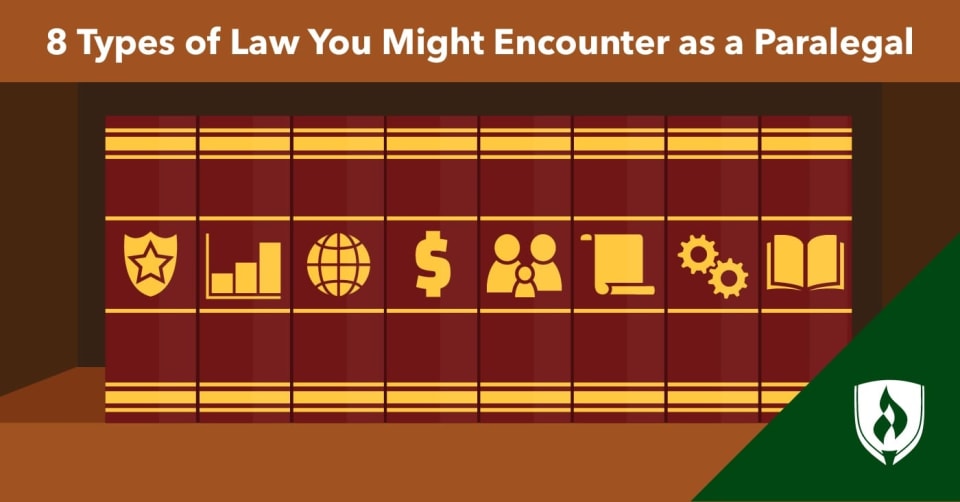
You have a natural curiosity about all things related to law. Your interest extends beyond watching popular legal dramas like “Suits” or “Law & Order.” You spend your commute listening to legal podcasts, and you devote your lunch break to following real-life court cases.
It might be time to turn your passion for law into a career as a paralegal. Choosing to become a paralegal isn’t the only decision you’ll have to make on this career path, however. Paralegals can choose to work in many different types of law. Determining the specialty that’s the best fit for you will depend on your interests, skills and personality. The first step is to familiarize yourself with your options. Curious about what type of courses you might encounter as a paralegal? Check out paralegal courses here.
8 Types of law for paralegals
We investigated these types of law for paralegals so you can make the final verdict about which specialty is right for you. Take a look at what we uncovered.
1. Criminal law
What is criminal law? Criminal law concerns itself with finding and punishing people who have broken the law by committing crimes. The goal of criminal law is to uncover the true perpetrator of a crime and exact justice. Criminal law includes a wide range of crimes, from homicides to pirating copyrighted material.
What do criminal law paralegals do? Criminal law paralegals can work for the prosecution or the defense. In both cases, paralegals will help attorneys prepare for trial by gathering evidence, arranging for witness interviews and filing legal documents with the court. During a trial, they can help their team win the case by reviewing trial notes and preparing exhibits for court.
2. Corporate law
What is corporate law? Corporate law is the system of criminal justice that makes sure businesses adhere to local and federal regulations for conducting business legally. Paralegals in this specialty might work for a single corporation as part of their in-house legal team, or they might work for a firm that works with many corporate clients.
What do corporate law paralegals do? Corporate paralegals spend much of their time performing routine job duties like filing legal paperwork and helping meet compliance standards, but they might also be called upon to help with litigation if a company is brought to court. Corporate paralegals often benefit from having experience with bookkeeping and finances.
3. International law
What is international law? International law governs the interactions between different countries. These laws are designed to promote trade and to keep all citizens safe. International law often deals with issues related to preserving the environment, establishing basic human rights and regulating trade.
What do international law paralegals do? These paralegals could be part of a team that’s involved in crafting treaties and trade agreements, or raising awareness of human rights abuses around the world. International law paralegals may have opportunities to travel, so consider this type of law if you have a strong interest in other cultures and international affairs.
4. Commercial law
What is commercial law? Commercial law—sometimes called trade law or business law—deals with commerce, trade and consumer transactions. This broad legal field includes areas like bankruptcy, contracts, mortgages and real estate, consumer credit and banking.
What do commercial law paralegals do? Paralegals in this legal specialty might find themselves reviewing contracts, filing bankruptcy documents, guiding debtors through the legal process or coordinating a real estate transaction. Paralegals who are interested in this type of law can look for a firm that focuses on the area of commercial law they’re most drawn to.
5. Family law
What is family law? This type of law handles cases related to family relationships, such as divorce and child custody, adoption and termination of parental rights. These cases often involve children, and some surround difficult circumstances, such as child abuse or domestic violence.
What do family law paralegals do? Family law paralegals might find themselves getting to know their firm’s clients on a more personal level than paralegals in other specialties. They can also expect to interact with social workers as they navigate tricky and emotional negotiations between parties. These paralegals might even serve as a guardian ad litem—that is, an impartial advocate—on behalf of a child.
6. Constitutional law
What is constitutional law? This area of law includes any legal proceedings related to upholding or interpreting the U.S. Constitution. Court cases might surround issues like due process, civil rights or freedom of speech.
What do constitutional law paralegals do? Constitutional law paralegals often work for nonprofit or public interest groups. It helps if they have an eye for detail and a love of history because much of their work will involve reading the Constitution itself, as well as researching the outcomes of past constitutional law cases.
7. Labor law
What is labor law? Labor laws oversee the relationship between employers and employees. Their goal is to ensure that employees aren’t taken advantage of by corporations, which typically have more bargaining power or resources than an individual employee. Labor laws govern issues like collective bargaining, unionization, benefits disputes and more.
What do labor law paralegals do? These paralegals assist their firm or corporation in preparing for labor disputes. They might work on cases related to strikes, unfair termination, harassment or discrimination in the workplace. On a more routine basis, they could help negotiate employee contracts.
8. Intellectual property law
What is intellectual property law? Intellectual property (IP) refers to intangible creative works or inventions that are protected by copyrights, trademarks or patents. These laws work to protect creators from copyright infringement.
What do intellectual property paralegals do? IP paralegals conduct trademark and patent research, file for trademarks and patents, and negotiate intellectual property rights. They also help attorneys prepare for litigation in cases of copyright violation or trademark infringement.
You be the judge on these types of law
You’re the judge and jury when it comes to choosing one of these types of law to specialize in as a paralegal. No matter what your verdict is, learn more about what it’s really like to be a paralegal in our article “What I Wish I Knew Before Becoming a Paralegal.”
To further explore the considerations of pursuing a legal career, delve into our article on "Is Being a Lawyer Worth it?"
Related Articles:




